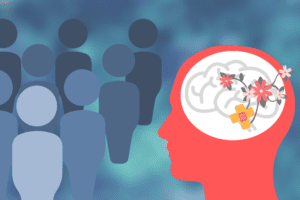The Dark Triad theory is a psychological framework that was put together by Delroy L. Paulhus & Kevin M. Williams in 2002 & describes a trio of personality traits: narcissism, Machiavellianism, & psychopathy. Each trait represents different aspects of a person’s interpersonal behavior & motivations.
Narcissism: A narcissist is mainly characterized by grandiosity (a sense of superiority & uniqueness), a need for admiration, & a lack of empathy. Narcissists often have an inflated sense of self-importance & may exploit others for personal gain.
Example: Alice constantly seeks recognition for her contributions, often overshadowing her teammates. She takes credit for group successes & is quick to highlight her achievements in meetings. Her need for admiration leads her to belittle others’ input, causing tension within the team.
Machiavellianism: This person is defined by manipulation, deceit, & a focus on self-interest. Individuals high in Machiavellianism may use cunning strategies to achieve their goals, often at the expense of others.
Example: Bob is highly strategic & uses manipulation to advance his position. He subtly spreads rumors about his coworkers to undermine their credibility while positioning himself as the go-to person. He often forms alliances only when it serves his interests, creating a climate of distrust among team members.
Psychopathy: Involves a lack of empathy & remorse, as well as impulsivity & antisocial behavior. Psychopaths tend to be charming & can manipulate others without feeling guilt.
Example: Charlie displays a charming demeanor but lacks genuine empathy. He meets deadlines with impressive efficiency but does so by stepping on others. When faced with setbacks, he shows no remorse for the impact on his colleagues & often engages in risky behavior that puts the project at jeopardy.
People who show such behaviors at the workplace make the environment toxic due to lack of collaboration. High turnover rates & decreased morale result from the interplay of these Dark Triad traits, highlighting the detrimental impact they can have on team dynamics & overall productivity.
Studying these traits in detail becomes important for an organization as a person with high scores in these traits is more likely to create severe problems for the organization, especially if they are in leadership roles. So, the next part of the blog will speak elaboratively about how businesses can identify these personality traits in their subordinates.
How to Recognize Dark Triad Personality Traits
Narcissism
- Exaggerated Self-Awareness: A narcissist often talks about their achievements & talents in an inflated manner.
- Need for Admiration: They are in constant need of validation & praise from others.
- Lack of Empathy: They show little or no concern for the needs & feelings of others & are dismissive of others’ emotions.
Machiavellianism
- Manipulative Behavior: A person with the trait of Machiavellianism often uses deceit or cunning strategies to achieve personal goals.
- Cynical Worldview: They believe that people are primarily motivated by self-interest just like them.
- Emotional Detachment: They may seem cold or are always calculating their interactions with others & making sure that they always derive benefit from others causing great emotional damage to others.
Psychopathy
- Impulsivity: A psychopath tends to act without thinking about the consequences.
- Shallow Emotions: They display just a limited range of emotions & may struggle to connect with others on a deeper level.
- Lack of Remorse: After causing harm to others, they rarely feel guilty or remorseful for their actions.
The Connection Between Dark Triad & B2B Relationships
1. Trust Issues
Individuals with high Machiavellian traits may use manipulative tactics. On the other hand, Narcissistic individuals may prioritize their interests over the partnership. All this leads to distrust among businesses.
2. Communication Challenges
Those high in these traits may withhold information or misrepresent facts, complicating negotiations & decision-making. Narcissists & psychopaths might adopt overly aggressive tactics, making it difficult to reach mutually beneficial agreements.
3. Impact on Team Dynamics
In team settings, individuals with Dark Triad traits can create a toxic environment, affecting morale & productivity. Their behavior may drive talented employees away, impacting overall teamwork & business performance.
4. Damage to Reputation
Companies associated with individuals exhibiting these traits may gain a negative reputation, affecting future partnerships & business opportunities. Organizations may struggle to align values & ethics with partners exhibiting Dark Triad traits, leading to long-term conflicts.
5. Antisocial Behavior
Their disregard for others’ feelings can lead to misunderstandings & conflicts that hinder collaboration. Partners may feel used or undervalued, leading to dissatisfaction & potential fallout.
Recognizing & managing these traits in B2B contexts is crucial for fostering healthy & productive business relationships. Confused about where to start from. Visit the BlewMinds website to get started with the help of certified coaches.




